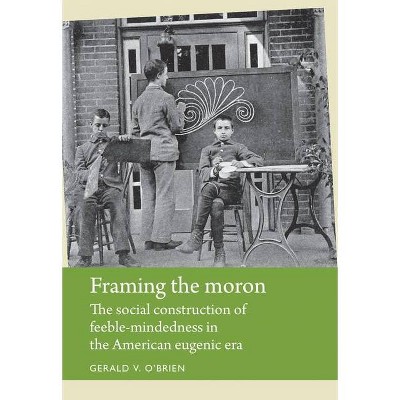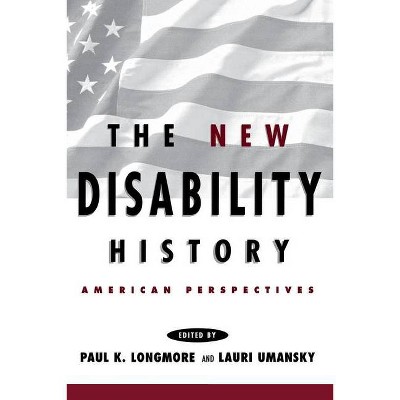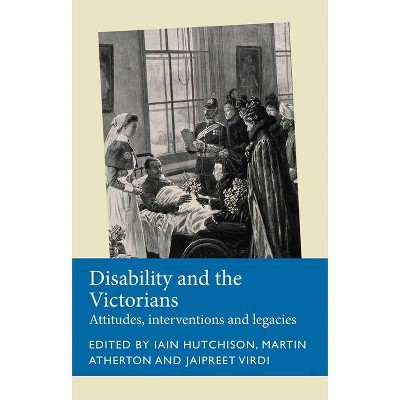Framing the Moron - (Disability History) by Gerald V O'Brien (Paperback)

Similar Products
Products of same category from the store
AllProduct info
<p/><br></br><p><b> About the Book </b></p></br></br>Framing the moron details the variety of dehumanizing and fear-inducing rhetoric employed by the American eugenic movement during the early twentieth century, which led to tens of thousands of innocent people being involuntarily sterilized, forced into institutions, and otherwise maltreated.<p/><br></br><p><b> Book Synopsis </b></p></br></br>Many people are shocked upon discovering that tens of thousands of innocent persons in the United States were involuntarily sterilized, forced into institutions, and otherwise maltreated within the course of the eugenic movement (1900DS30). Such social control efforts are easier to understand<br>when we consider the variety of dehumanizing and fear-inducing rhetoric propagandists invoke to frame their potential victims. <p/>This book details the five major themes employed within the context of eugenic propaganda, and provides numerous examples of their use based on original sources of the period. These include the organism, animal, war or national catastrophe, religious and object metaphors. Rhetoric related to these<br>themes was utilized to demonstrate the extent of potential harm posed by the presumptive unrelenting child-bearing among unfit groups; a threat that could only be countered by ensuring that such persons did not breed. Early in the twentieth century the term moron was developed to describe the<br>primary targets of eugenic control. This book demonstrates how the image of moronity in the United States was shaped by eugenicists. <p/>The book will be of interest not only to disability and eugenic scholars and historians, but to anyone who wants to explore the means by which pejorative metaphors are used to support social control efforts against vulnerable community groups. While readers may be appalled at the use of such<br>rhetoric to support control efforts, they will also no doubt draw parallels regarding the use of similar language in contemporary socio-political speeches and writings.<br><p/><br></br><p><b> From the Back Cover </b></p></br></br>Many people are shocked upon discovering that tens of thousands of innocent persons in the United States were involuntarily sterilized, forced into institutions, and otherwise maltreated within the course of the eugenic movement (1900-30). Such social control efforts are easier to understand when we consider the variety of dehumanizing and fear-inducing rhetoric propagandists invoke to frame their potential victims. This book details the five major themes employed within the context of eugenic propaganda, and provides numerous examples of their use based on original sources of the period. These include the organism, animal, war or national catastrophe, religious and object metaphors. Rhetoric related to these themes was utilized to demonstrate the extent of potential harm posed by the presumptive unrelenting child-bearing among unfit groups; a threat that could only be countered by ensuring that such persons did not breed. Early in the twentieth century the term "moron" was developed to describe the primary targets of eugenic control. This book demonstrates how the image of moronity in the United States was shaped by eugenicists. The book will be of interest not only to disability and eugenic scholars and historians, but to anyone who wants to explore the means by which pejorative metaphors are used to support social control efforts against vulnerable community groups. While readers may be appalled at the use of such rhetoric to support control efforts, they will also no doubt draw parallels regarding the use of similar language in contemporary socio-political speeches and writings.<p/><br></br><p><b> Review Quotes </b></p></br></br><br><br>O'Brien's book is a welcome addition to the scholarship on eugenics and to the growing number of studies dedicated to disability, marginality, and stigma in the twentieth century and beyond. Its publication, now in paperback, will hopefully ensure it a broader readership, especially among students<br>and the general public. - Marius Turda, Isis-Volume 107, Number 4, December 2016 <br><p></p><br><br><p/><br></br><p><b> About the Author </b></p></br></br><br>Gerald V. O'Brien is Professor of Social Work at Southern Illinois University Edwardsville<br>
Price History
Price Archive shows prices from various stores, lets you see history and find the cheapest. There is no actual sale on the website. For all support, inquiry and suggestion messagescommunication@pricearchive.us




















